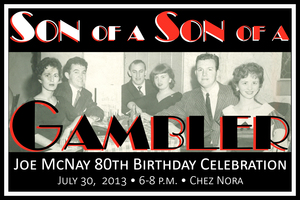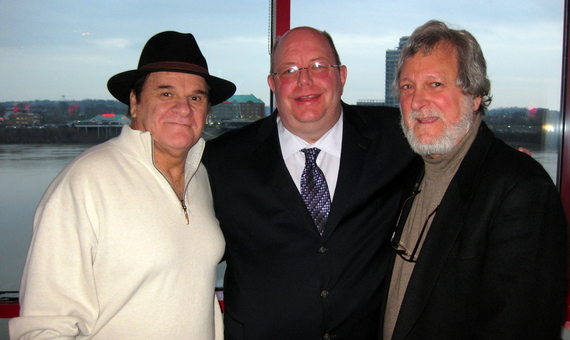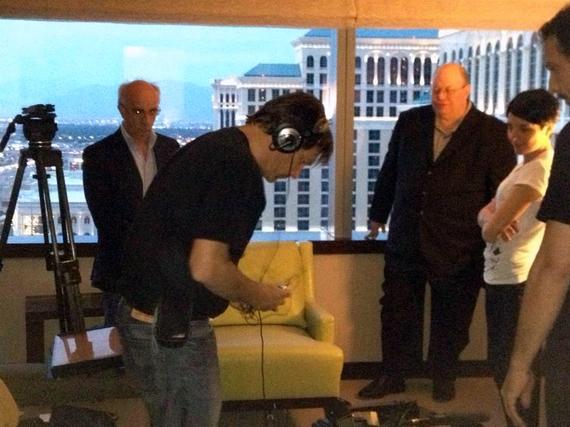"Every breath you take
Every move you make
Every bond you break
Every step you take
I'll be watching you"
-The Police
My father was a bookie. Thus, our 1970s household was a cutting edge hub of telephone technology. Dad had numerous friends at the telephone company and was on a never-ending quest to keep his conversations from being recorded by law enforcement.
We were the first house in the Cincinnati area to have features like call forwarding and caller ID. Dad changed his phone number every few months, and during football season he changed it every few weeks. He worked from a fake dry cleaners in Newport, Kentucky that I "managed" while I was in high school. (If someone wandered in and actually wanted something dry cleaned, my job was to take it to a real dry cleaners up the street.)
Dad and I were watching a man install a new telephone line in the dry cleaners. About a minute after the line was installed, it rang. Dad picked up the phone and it was the police chief from a nearby city.
The policeman said, "Joe, Opening Day for the Reds is coming up shortly. I wanted to make sure you were going to give me tickets this year." Dad responded, "I have them in my pocket and I'm getting ready to bring them to you." Dad paused for a second. "By the way, how did you get this number?" He said, "Joe, I am the Chief of Police," and hung up.
Dad just found out. He wasn't fooling anybody.
After that, he didn't make a lot of effort changing phone numbers. He realized that no matter how hard he tried, he couldn't keep things in his phone calls secret.
After reading Adam Tanner's masterpiece, What Stays in Vegas: The World of Personal Data -- Lifeblood of Big Business--and the End of Privacy as We Know It, I feel like my father on the day that the Chief called. Fighting for privacy is futile.
No matter how hard I work to protect my privacy, my emails, my spending habits and the fact that I have seen several movies starring Scarlett Johansson, someone out there knows about it. I don't think that Scarlett, or my wife, knew about my viewing habits, but some big data center, or probably multiple data centers, know things about me that even I don't know.
Like most of us brought up on George Orwell, I always thought that Big Brother would be the government. Not so. Data mining companies like Acxiom are light years ahead of the NSA in what they know about us and how they gather it with our tacit permission.
You know those 40-page disclaimers that all websites have and none of us read? Those give data mining companies the opportunity to track our every view, click, purchase and reading pattern. Tanner doesn't really offer a privacy solution because there is really not one. Government can huff and puff about regulating data gathering, but technology is growing too rapidly and too much information is out there already to ever put the genie back in the bottle.
Tanner's book is one of the best business books written this year; in fact, it is one of the best business books in this century. It reminds me of Joe Nocera's first book, A Piece of the Action, in that it combines detailed knowledge of his subject matter with an excellent writing style, countless personal interviews and observations of events.
Turner brings a unique skill set to this project. He is a Fellow at the Institute for Quantitative Social Science at Harvard. (I'm not sure what he does, but it sounds impressive.) He had a long career with Reuters as a bureau chief and had the unique opportunity to spend a year with Gary Loveman, the president of Caesars Entertainment. It's a great book because he worked hard at making it so.
I bought the book as an impulse before a flight this weekend. I'm sure some data mining program at Amazon got me there. It was like reading a well-written novel. I couldn't put the book down until I finished it and will go back to it many times, over many years. A must-read.
After my dad moved away from bookmaking, he had a great career as a travel agent, organizing junkets from Cincinnati to Las Vegas. High rollers were escorted by showgirls, given front row tickets to events and taken backstage of every entertainer who was big in Vegas at that time. Most importantly, everyone was "comped." All the gamblers got their rooms, food and flight to Las Vegas given to them for free. In return, they were expected to spend a certain amount of money gambling.
By the time that Dad died in 1993, he saw that the corporations were taking over and "comps" were harder to come by. Despite growing up around the gambling industry, I've never been interested in going to casinos, and after reading Christina Binkley's 2008 book, Winner Takes All: Steve Wynn, Kirk Kerkorian, Gary Loveman, and the Race to Own Las Vegas, the one thing I was never going to do is get a casino rewards card. Binkley noted how Caesars and other casinos used the rewards cards to track players betting habits and used that information to market to them.
I've gone to several casinos, but never with a rewards card. Even when I visited them as a journalist, I wanted to keep my occasional bets under the radar. After reading Tanner's books, I'm signing up for casino cards immediately. I might as well get on the list and see if I can get some free coupons or a t-shirt.
What Stays in Vegas makes me feel silly about is my vain attempts to protect privacy. I've resisted savings cards for years and had a grocery store card in the name of my daughter's cat. The store figured out I wasn't a cat a long time ago, but never let me in on the secret. After reading the book, I realize that rewards cards are out in the open about their data tracking, while most of the best information comes from sources, like your computer, that you may or may not know about.
Despite the title, the book is not focused on the gambling industry. It is about the data industry. Casinos do a terrific job in tracking their customers and there is an argument to be made that data mining actually improves customer service when done correctly. Tanner gives an even-handed view of the positives and the negatives.
The book is an incredible insight into a world that most of us have never heard of. It's a multi-billion dollar world that tracks our every move and tries to entice us to spend dollars with them or their clients. The people who run these companies really know what they are doing and the technology they implement is impressive and powerful.
I'm a little distraught that any sense of privacy is gone. I've spent my adult life thinking I was outsmarting someone, or some big computer, and really I am not. On the other hand, I find the disclosure somewhat liberating. If no one has privacy, we will eventually get over any sense of embarrassment or shame when our private behaviors become more public. That may work out fine.
Even if it doesn't work out, it is what it is.
My battle with the death of privacy is a little like going through the five stages of grief that Elisabeth Kubler-Ross developed. I'm just out of denial, but not really angry about it. I see no sense in bargaining and I'm not particularly depressed. Thus, I've made it to the stage of acceptance fairly quickly.
We've obviously accepted data tracking in our lives a long time ago. We just never got up and acknowledged it. I can see politicians and publicity seekers trying to get media attention by coming up with laws and regulations, but they are wasting our time when they do so.
The good news is that their pollsters will tell them when they are.
Companies that track consumer behaviors are one of the most dominant forces in our lives. We need to know something about them.
Adam Tanner's book is the way to make that happen.
Don McNay is the founder of McNay Consulting,http://www.mcnayconsulting.com a best-selling author and an expert on what to do when you win the lottery. Among his bestselling books are Life Lessons from the Lottery: Protecting Your Money in a Scary Worldhttp://www.amazon.com/Life-Lessons-Lottery-Protecting-Money-ebook/dp/B00A5WUOMW and Son of a Son of a Gambler: Winners, Losers and What to Do When You Win the Lottery.http://www.amazon.com/Son-Gambler-Winners-Losers-Lottery-ebook/dp/B00DIDB9OM/ref=la_B002BLN9C2_1_7_title_1_kin?s=books&ie=UTF8&qid=1410273766&sr=1-7



